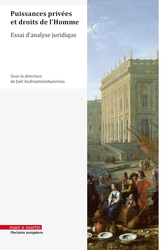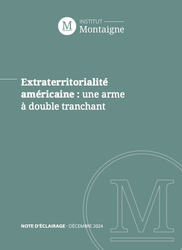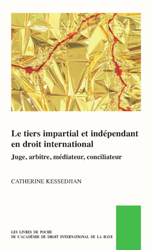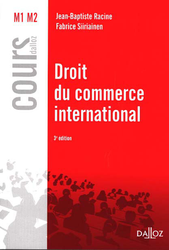Thesaurus : Doctrine
Référence générale, Cohendet, M.-A. et Fleury, M., Droit constitutionnel et droit international de l'environnement, Revue française de droit constitutionnel , PUF, » 2020/2, n°122, p.271-297.
___
Résumé de l'article :
Thesaurus : Doctrine

► Référence complète : M. M. Mohamed Salah, "Conclusions", in J. Andriantsimbazovina (dir.), Puissances privées et droits de l'Homme. Essai d'analyse juridique, Mare Martin, coll. "Horizons européens", 2024, pp. 297-314
____
► Résumé de l'article :
____
🦉Cet article est accessible en texte intégral pour les personnes inscrites aux enseignements de la Professeure Marie-Anne Frison-Roche
________
Sept. 4, 2025
Editorial responsibilities : Direction of the collection "Regulations & Compliance", JoRC & Dalloz

🌐follow Marie-Anne Frison-Roche on LinkedIn
🌐subscribe to the Newsletter MAFR. Regulation, Compliance, Law
____
► Full Reference: M.-A. Frison-Roche (dir.), L'Obligation de Compliance, coll."Régulations & Compliance", Journal of Regulation & Compliance (JoRC) and Dalloz, to be published.
____
📘 At the same time, a book in English, Compliance Obligation, is published in the collection copublished by the Journal of Regulation & Compliance (JoRC) and the Éditions Bruylant.
____
🧮the book follows the cycle of colloquia 2023 organised by the Journal of Regulation & Compliance (JoRC) and its Universities partners.
____
📚this volume is one of a series of books devoted to Compliance in this collection.
► read the presentations of the other books:
- further books:
🕴️M.-A. Frison-Roche (ed.), 📕Le système probatoire de la Compliance, 2027
🕴️M.-A. Frison-Roche (ed.), 📕Compliance et Contrat, 2026
- previous books:
🕴️M.-A. Frison-Roche & M. Boissavy (eds.), 📕Compliance et droits de la défense. Enquête interne - CJIP - CRPC, 2024
🕴️M.-A. Frison-Roche (ed.), 📕La juridictionnalisation de Compliance, 2023
🕴️M.-A. Frison-Roche (ed.), 📕Les Buts Monumentaux de la Compliance, 2022
🕴️M.-A. Frison-Roche (ed.), 📕Les outils de la Compliance, 2021
🕴️M.-A. Frison-Roche (ed.), 📕Pour une Europe de la Compliance, 2019
🕴️N. Borga, 🕴️J.-Cl. Marin and 🕴️J.-Ch. Roda (eds.), 📕Compliance : l'Entreprise, le Régulateur et le Juge, 2018
🕴️M.-A. Frison-Roche (ed.), 📕Régulation, Supervision, Compliance, 2017
🕴️M.-A. Frison-Roche (ed.), 📕Internet, espace d'interrégulation, 2016
📚see the global presentation of all the books of the collection.
___
► General presentation of this book: Compliance is sometimes presented as something that cannot be avoided, which is tantamount to seeing it as the legal obligation par excellence, Criminal Law being its most appropriate mode of expression. It is sometimes presented as something that the company does out of ethical concern, self-regulation which is the opposite of legal obligation. For the moment, therefore, there is no single vision of the Compliance Obligation. This is all the less the case because of the multitude of texts, themselves constantly evolving and changing, which inject such a wide range of compliance obligations that we give up trying to establish any unity, thinking that, on a case-by-case basis, we will define a regime and a legal constraint of greater or lesser strength, aimed at one subject or debtor or another, for the benefit of one or other.
This lack of unity, due to the absence of a definition of the Compliance Obligation, makes the application of the texts difficult to foresee and therefore makes the Judge fearful, even though he/she is going to take on more and more importance.
This book asks the practical questions: What is Compliance obliging? Who is obliged to comply? and How far are we obliged to comply? and provides answers, Compliance practices, constraints and innovations will be better mastered and anticipated by all those they affect: companies, stakeholders, technicians, lawyers, consultants, institutions and courts.
____
🏗️general construction of this Book: The book opens with a double Introduction. The first, which is freely accessible, consists of a summary of the book, while the second, which is substantial, deals with the unified conception that we can, and indeed should, have, of the "Compliance Obligation", without losing the concrete and active character that characterises this branch of law.
The first Part of the book aims to define the Compliance Obligation. To this end, Chapter I deals with the Nature of this obligation. Chapter II deals with the Spaces of the Compliance Obligation.
The Part II aims to articulate the Compliance Obligation with other branches of Law.
The Part III of the book looks at the way in which the possibility of obliging and the means of obliging are provided. To this end, Chapter I deals with the Convergence of the Sources of the Compliance Obligation. Chapter II considers International Arbitration as a reinforcement of the Compliance Obligation. To this end, Chapter I deals with the Convergence of the Sources of the Compliance Obligation. Chapter II considers International Arbitration as a reinforcement of the Compliance Obligation.
The last Part of the book is devoted to Vigilance, the leading edge of the Compliance Obligation. Chapter I is devoted to a study of the various sectors, and analyses the Intensities of the Vigilance Obligation. Chapter II deals with the Variations in Tension generated by the Vigilance Obligation. Finally, Chapter III deals with the New Modalities of the Compliance Obligation, highlighted by the Vigilance Imperative.
____
TABLE OF CONTENTS
ANCRER LES OBLIGATIONS DE COMPLIANCE SI DIVERSES
DANS LEUR NATURE, LEURS REGIMES ET LEUR FORCE
POUR DEGAGER L'UNITE DE L'OBLIGATION DE COMPLIANCE
LA RENDANT COMPREHENSIBLE ET PRATIQUABLE
(ANCHOR COMPLIANCE OBLIGATIONS, SO DIVERSE
IN THEIR NATURE, THEIR REGIMES AND THEIR FORCE,
TO BRING OUT THE UNITY OF THE COMPLIANCE OBLIGATION
MAKING IT COMPREHENSIBLE AND PRACTICABLE)
TITRE I.
CERNER L’OBLIGATION DE COMPLIANCE
(IDENTIFYING THE COMPLIANCE OBLIGATION)
CHAPITRE I : LA NATURE DE L’OBLIGATION DE COMPLIANCE (THE NATURE OF THE COMPLIANCE OBLIGATION)
Section 1 ♦️ La volonté, le cœur et le calcul, les trois traits cernant l'Obligation de Compliance (Will, Heart and Calculation, the three traits encercling the Compliance Obligation), by 🕴️Marie-Anne Frison-Roche
Section 2 ♦️ De la dette à l’obligation de compliance (From the Debt to the Compliance Obligation), by 🕴️Bruno Deffains
Section 3 ♦️ Obligation de Compliance et droits humains (Compliance Obligation and Human Rights), by 🕴️Jean-Baptiste Racine
Section 4 ♦️ L'Obligation de Compliance et les mutations de la souveraineté et de la citoyenneté (Compliance Obligation and changes in Sovereignty and Citizenship), by 🕴️René Sève
Section 5 ♦️ La définition de l''obligation de compliance confrontée au droit de la cybersécurité (The definition of the Compliance Obligation in Cybersecurity Law) by🕴️Michel Séjean
CHAPITRE II : LES ESPACES DE L’OBLIGATION DE COMPLIANCE (SPACES OF THE COMPLIANCE OBLIGATION)
Section 1 ♦️ Entités industrielles et Obligation de compliance (Industrial entities and Compliance Obligation), by 🕴️Etienne Maclouf
Section 2 ♦️ L'Obligation de Compliance dans les chaînes de valeur (The Compliance Obligation in Value Chains), by 🕴️Lucien Rapp
Section 3 ♦️ Compliance et conflits de lois. Le droit international de la vigilance-conformité à partir de quelques applications récentes sur le continent européen (Compliance and conflict of laws. International Law of Vigilance-Conformity, based on recent applications in Europe), by 🕴️Louis d'Avout
TITRE II.
ARTICULER L’OBLIGATION DE COMPLIANCE AVEC DES BRANCHES DU DROIT
(ARTICULATING THE COMPLIANCE OBLIGATION WITH BRANCHES OF LAW)
Section 2 ♦️ Droit fiscal et obligation de compliance (Tax Law and Compliance Obligation), by 🕴️Daniel Gutmann
Section 3 ♦️ Le droit processuel, prototype de l'Obligation de Compliance (General Procedural Law, prototype of the Compliance Obligation), by 🕴️Marie-Anne Frison-Roche
Section 4 ♦️ Le droit des sociétés et des marchés financiers face à l'Obligation de Compliance (Corporate and Financial Markets Law facing the Compliance Obligation), by 🕴️Anne-Valérie Le Fur
Section 5 ♦️ Le rapport entre le Droit de la responsabilité civile et l'Obligation de Compliance (The link between Tort Law and Compliance Obligation), by 🕴️Jean-Sébastien Borghetti
Section 6 ♦️ Dimensions environnementales et climatiques de l'Obligation de Compliance (Environmental and Climatic Dimensions of the Compliance Obligation), by 🕴️Marta Torre-Schaub
Section 7 ♦️ Droit de la concurrence et Droit de la Compliance (Competition Law and Compliance Law), by 🕴️Jean-Christophe Roda
Section 8 ♦️ L'Obligation de Compliance en Droit global (The Compliance Obligation in Global Law), by 🕴️Benoît Frydman & 🕴️Alice Briegleb
Section 9 ♦️ Les juges du droit des entreprises en difficulté et les obligations de compliance (Judges of Insolvency Law and Compliance Obligations), by 🕴️Jean-Baptiste Barbièri
TITRE III.
COMPLIANCE : DONNER ET SE DONNER LES MOYENS D’OBLIGER
(COMPLIANCE : GIVE AND TAKE THE MEANS TO OBLIGE)
CHAPITRE I : LA CONVERGENCE DES SOURCES (CONVERGENCE OF SOURCES)
Section 1 ♦️ Obligation sur obligation vaut (Compliance Obligation on Obligation works), by 🕴️Marie-Anne Frison-Roche
Section 2 ♦️ Les technologies disponibles, prescrites ou proscrites pour satisfaire Compliance et Vigilance (Technologies available, prescribed or prohibited to meet Compliance and Vigilance requirements), by 🕴️Emmanuel Netter
Section 3 ♦️ Contrainte légale et stratégie des entreprises en matière de Compliance (Legal Constraint and Company Strategies in Compliance matters), by 🕴️Jean-Philippe Denis & Nathalie Fabbe-Costes
Section 4 ♦️ La loi, source de l’Obligation de Compliance (The Law, source of the Compliance Obligation), by 🕴️Jean-Baptiste Blanc
Section 5 ♦️ Opposition et convergence des systèmes juridiques américains et européens dans les règles et cultures de compliance (Opposition and Convergence of American and European Legal Systems in Compliance Rules and Cultures), by 🕴️Raphaël Gauvain & 🕴️Blanche Balian
Section 6 ♦️ Ce à quoi les engagements engagent qu'est un engagement (What a ), by 🕴️Marie-Anne Frison-Roche
CHAPITRE II : L’ARBITRAGE INTERNATIONAL EN RENFORT DE L’OBLIGATION DE COMPLIANCE (INTERNATIONAL ARBITRATION IN SUPPORT OF THE COMPLIANCE OBLIGATION)
Section 1 ♦️ Comment l'arbitrage international peut être un renfort de l'Obligation de Compliance (How International Arbitration can reinforce the Compliance Obligation), by 🕴️Laurent Aynès
Section 2 ♦️ La considération par l'Arbitrage de l'Obligation de Compliance pour une place d'arbitrage durable (Arbitration' consideration of Compliance Obligation for a Sustainable Arbitration Place), by 🕴️Marie-Anne Frison-Roche
Section 3 ♦️ L’usage de l’arbitrage international pour renforcer l’obligation de Compliance : l’exemple du secteur de la construction (The use of International Arbitration to reinforce the Compliance Obligation: the example of the construction sector), by 🕴️Christophe Lapp
Section 4 ♦️ L’arbitre, juge, superviseur, accompagnateur ? (The Arbitrator, Judge, Supervisor, Support) , by 🕴️Jean-Baptiste Racine
TITRE IV.
LA VIGILANCE, POINTE AVANCÉE DE L’OBLIGATION DE COMPLIANCE
(VIGILANCE, SPEARHEAD OF THE COMPLIANCE OBLIGATION)
Section 1 ♦️ La Vigilance, pointe avancée et part totale de l'Obligation de Compliance (....), by 🕴️Marie-Anne Frison-Roche
CHAPITRE I : LES INTENSITÉS DE L’OBLIGATION DE VIGILANCE, POINTE AVANCÉE DU SYSTÈME DE COMPLIANCE (INTENSITIES OF THE VIGILANCE OBLIGATION, SPEARHEAD OF THE COMPLIANCE SYSTEM)
Section 2 ♦️ L’intensité de l’Obligation de Vigilance selon les secteurs : le cas des opérateurs financiers (Intensity of the Vigilance Obligation by Sectors: the case of Financial Operators), by 🕴️Anne-Claire Rouaud
Section 3 ♦️ L’intensité de l’Obligation de Vigilance selon les secteurs : le cas des opérateurs bancaires et d’assurance (Intensity of the Vigilance Obligation by Sectors: the case of Banking and Insurance Operators), by 🕴️Mathieu Françon
Section 4 ♦️ L’intensité de l’obligation de vigilance selon les secteurs : le cas des opérateurs numériques (Intensity of the Vigilance Obligation by Sectors: the case of Digital Operators), by 🕴️Grégoire Loiseau
Section 5 ♦️ L’Obligation de vigilance des opérateurs énergétiques (The Vigilance obligation of Energy Operators), by 🕴️Marie Lamoureux
Section 2 ♦️ Transformation de la gouvernance et obligation de Vigilance (Transformation of Governance and Vigilance Obligation), by 🕴️Véronique Magniermag
CHAPITRE II : LES DISPUTES AUTOUR DE L'OBLIGATION DE VIGILANCE, POINTE AVANCÉE DU SYSTÈME DE COMPLIANCE, DANS SON RAPPORT AVEC LA RESPONSABILITÉ
Section 1 ♦️ Le rapport entre le droit de la responsabilité civile et l'obligation de compliance, by 🕴️Jean-Sébastien Borghetti
Section 2 ♦️ Repenser le concept de responsabilité civile à l’aune du devoir de vigilance, pointe avancée de la compliance (Rethinking the Concept of Civil Liability in the light of the Duty of Vigilance, Spearhead of Compliance), by 🕴️Mustapha Mekki
Section 3 ♦️ Tensions et contradictions entre les instruments relatifs à la vigilance raisonnable des entreprises, by 🕴️Laurence Dubin
Section 4 ♦️ Compliance, Vigilance et Responsabilité civile : mettre en ordre et raison garde (Compliance, Vigilance and Civil Liability: put in order and keep the Reason), by 🕴️Marie-Anne Frison-Roche
CHAPITRE III : LES MODALITÉS NOUVELLES DE L'OBLIGATION DE COMPLIANCE, MISES EN LUMIÈRE PAR L'IMPÉRATIF DE VIGILANCE (NEW MODALITIES OF THE COMPLIANCE OBLIGATION, HIGHLIGHTED BY THE VIGILANCE IMPERATIVE)
Section 1 ♦️ Clauses et contrats, modalités de l’obligation de vigilance (Clauses and Contracts, terms and conditions of implementation of the Vigilance Obligation), by 🕴️Gilles J. Martin
Section 2 ♦️ La preuve de la bonne exécution de la Vigilance au regard du système probatoire de Compliance (Proof that Vigilance has been properly carried out with regard to the Compliance Evidence System), by 🕴️Jean-Christophe Roda
TITRE V.
LE JUGE ET L'OBLIGATION DE COMPLIANCE
(THE JUDGE AND THE COMPLIANCE OBLIGATION)
Section 1 Section 1 ♦️ Devoir de vigilance et litiges commerciaux : une compétence à partager ?, par 🕴️François Ancel
Section 2 ♦️ Les enjeux présents à venir de l’articulation des principes de procédure civile et commerciale avec la logique de compliance (Present and Future Challenges of Articulating Principles of Civil and Commercial Procedure with the Logic of Compliance), by 🕴️Thibault Goujon-Bethan
Section 3 ♦️ Le juge de l’amiable et la compliance (The amicable settlement judge and compliance), by 🕴️Malik Chapuis
Section 4 ♦️ Le Juge requis pour une Obligation de Compliance effective (The Judge required for an Effective Compliance Obligation), by 🕴️Marie-Anne Frison-Roche
L’OBLIGATION DE COMPLIANCE : VISION D’ENSEMBLE
(COMPLIANCE OBLIGATION : OVERVIEW)
♦️ L'obligation de compliance, charge portée par les entreprises systémiques donnant vie au Droit de la Compliance. - lignes de force de l'ouvrage (The Compliance Obligation, a burden borne by Systemic Companies giving life to Compliance Law - key points of the book (free access) by 🕴️Marie-Anne Frison-Roche
________
Dec. 5, 2024
Thesaurus : Doctrine

► Full Reference: G. Wright & L. Chetcuti, US Extraterritoriality: The Trump Card, Institut Montaigne, Explainer, December 2024, 62 p.
____
____
📓read the English Summary of the Explainer
____
📓read the presentation of this Explainer made on the Institut Montaigne's website
____
► English Summary of the Explainer (done by the Authors): "Extraterritoriality — the application of national laws abroad — has grown exponentially over the last two decades. In a world characterized by strategic competition and weak international organizations, many countries are turning to law to secure their interests. None more than the United States.
There are good and bad uses of US extraterritoriality. It has become a key tool to uphold international law and to safeguard the US’ interests. It has helped to sanction hostile states and combat corruption, money laundering, organized crime and terrorism. It has helped to reduce excessive risk-taking by companies and has been used to manage US-China systemic rivalry. However, the US has also been accused of using it as a way to assert market dominance.
Could extraterritoriality be the next Trump Card the United States plays? During his first term, President Trump tightened export controls and expanded US laws to combat human rights abuses. At the same time, he rolled back banking regulations and asked his team to review US laws that created unnecessary red tape. Recently, he warned that he would remove any sanctions that weakened the dollar’s dominant position. The extent to which extraterritoriality is used to exert political pressure on EU countries is unclear.
The EU must be better prepared. Companies that fail to comply with US rules risk huge fines, handover of sensitive data and exclusion from the US market. European companies often prefer to comply with US rules, rather than abide by European measures designed to block their application. This poses a direct challenge to the sovereignty of the EU and its member states.
Institut Montaigne’s latest issue paper provides a framework for understanding all dimensions of US extraterritoriality and offers decision-makers and businesses a roadmap for an informed response. Understanding the implications of US extraterritoriality is crucial for governments and businesses, and should be integral to the EU's approach to economic security.".
________
Dec. 5, 2024
Thesaurus : Convention, contract, settlement, engagement

► Full Reference: M. Duchâtel & G. Wright, China’s Extraterritoriality: A New Stage of Lawfare, Institut Montaigne, Explainer, December 2024, 72 p.
____
____
📓read the English Summary of the Explainer
____
📓read the presentation of this Explainer made on the Institut Montaigne's website
____
► English Summary of the Explainer (done by the Authors): "Extraterritoriality - the application of national laws abroad - is gaining traction. In a world characterized by strategic competition and weakened international organizations, many countries are turning to law to secure their interests. This includes China.
Extraterritoriality has expanded under Xi Jinping. China no longer sees it as a relic of "the century of humiliation" during which foreign powers imposed consular jurisdiction on Chinese soil. Today, Chinese extraterritoriality has three aims: to defend against foreign interference and sanctions; to legitimize China’s foreign policy actions and strengthen its global influence; and as a way to deploy its public security agenda abroad.
China is also exploring a more offensive approach to extraterritoriality in the form of economic sanctions – though it has yet to use them. A more offensive use will depend on the willingness of the top leadership to employ such tactics during moments of international tension; a stronger international role for the renminbi and lower overall exposure to the dollar; and the countermeasures that third-countries could take to respond to Chinese extraterritorial norms.
The EU must act. Europeans need to understand the risks associated with Chinese extraterritoriality and plan accordingly. The EU should continue working with like-minded partners and be ready to deny access to the EU single market in case of abuse. Losing access to the single market would be deeply damaging to China’s interests and constitute a powerful deterrent for the EU.
Institut Montaigne’s latest issue paper provides a framework for understanding all dimensions of Chinese extraterritoriality and offers decision-makers and businesses a roadmap for an informed response. Understanding the implications of Chinese extraterritoriality is crucial for governments and businesses, and should be integral to the EU's approach to economic security.".
________
Sept. 8, 2024
Law by Illustrations

► Référence complète : M.-A. Frison-Roche., "Un martyr au service du Droit et de la Justice, caché sous un titre d'un quelconque thriller : 𝑴𝒆𝒏𝒂𝒄𝒆 𝒂𝒖 𝒔𝒐𝒎𝒎𝒆𝒕", billet septembre 2024.
► voir le film-annonce
___
En 2023, sort un film suédois.
Il est présenté comme un "thriller au suspense insoutenable", ce que son titre français soutient : 𝑴𝒆𝒏𝒂𝒄𝒆 𝒂𝒖 𝒔𝒐𝒎𝒎𝒆𝒕.
Ce n'est pas un thriller. Il n'y a pas une menace au sommet. Et cela n'est pa insoutenable.
C'est l'histoire d'un homme seul.
Pourtant quand il revient 3 jours à sa vie, en Suède, avec ses amis, il est comme vous et moi : il déjeune dans un jardin, respire l'air frais, voudrait bien acheter une jolie petite maison, demande des nouvelles de la famille.
Mais quand il remplit son office, il est seul.
Il a tout pour être absolument seul.
Nous sommes au début des années 60.
Il vit à New-York et travaille toute la journée. Lorsqu'on est le Secrétaire Général de l'ONU l'on a peu de temps pour aller dans des dîners, pour se promener avec un chien dans Central Park. Un chien, des enfants, une femme, il n'en a pas. Il a un petit singe, qu'il a ramené de Somalie, sans doute un des nombreux pays où il a été pour aider, aider, aider. Peut-être avec succès ou pas. Peut-être de la bonne façon ou pas. Cela n'est pas dit, ce que l'on voit, c'est son petit singe qui est sur son épaule, qui s'asseoit sur sa feuille où il peut enfin s'exprimer dans sa langue natale, qui court sur son table où il dine seul, toujours seul.
Il est toujours habillé pareil.
Chaque matin, il met une chemise blanche identique à celle de la veille. Chaque matin, il lace ses chaussures.
Car chaque matin, il va à son bureau pour que lui tombe dessus les catastrophes, les urgences, les drames, les situations insolubles.
A chaque fois, il essaie de trouver la moins pire des solutions, de trouver les moins pires des interlocuteurs. Et il rentre chez lui.
Pourquoi faire cela ?
Il écrit en suédois, avec son petit singe sur son épaule que dans sa solitude, qui n'est pas un drame, qui est son état, il faut trouver ce pourquoi il faut se sacrifier.
Il a déjà consacré toutes les années précédentes à accompagner la décolonisation ; il croit au droit des peuples à disposer d'eux-mêmes. Il fait tout ce qu'il peut pour que la décolonisation se passe le moins mal possible en Afrique à l'égard des pays européens et maintenant que les pays ne soient pas tenus par les Etats-Unis et l'Union Soviétique.
il ne fait que travailler.
Hegel appellerait cela un fonctionnaire, mais l'on nous dit que ce film n'est pas un cours de philosophie politique, puisque c'est un "thriller au suspense insoutenable".
Un jour, un coup d'Etat arrive dans un de ces pays d'Afrique.
Le Premier Ministre de ce pays vient le voir pour le dire, que le pays va être dépecé car une province aux ressources minières convoitée qui doit être détachée pour être mieux tenue par ceux d'avant, que lui-même est en danger, qu'il faut qu'il fasse quelque chose.
Il répond qu'il lui faut un peu de temps.
Le Premier Ministre revient dans son pays. Il est immédiatement assassiné.
Des massacres débutent.
Une guerre civile menace.
La province dans laquelle sont ces ressources minières considérables notamment pour la fabrication de la bombe atomique, déclare sa secession. Des industriels étrangers se réunissent. Des réunions se tiennent dans le pays avec le nouveau président avec des représentants des divers intérêts.
Le Secrétaire Général dit : nous allons envoyer des casques bleus et ensuite nous réunirons le Conseil de Sécurité.
En cela, il se condamne.
Il est critiqué de tous les côtés.
Le Conseil de sécurité se réunit.

Lors de la réunion de celui-ci, l'URSS demande sa démission immédiate car en envoyant les casques bleus dans ce qui est en réalité une opération militaire il a excédé ses pouvoirs et il a pris parti.
Il répond qu'il a été mandaté pour que l'ONU accompagne la décolonisation et que les pays concernés soient en paix, que la paix est la mission de l'ONU, que la paix implique que les pays décolonisés ne soient pas soumis à la puissance de l'un ou l'autre des deux blocs qui sont à la manœuvre en alliance avec les industries impliquées.
En disant cela, il se condamne une deuxième fois.
Il revient dans son bureau où il apprend que son compagnon le petit singe s'est libéré de sa petite cage capitonnée de velours rouge où il demeure quand il attend son retour , a grimpé dans l'escalier, s'est étranglé par la fine laisse qui lui entourait le cou et qu'il est mort. Leur sort est parallèle, ce n'est qu'une anticipation. Il répond qu'il veut qu'on ôte son cadavre pour qu'il n'ait pas à voir son cadavre en rentrant (il n'est pas masochiste, juste dévoué à ce qu'il pense être juste).
Dans le pays les massacres continuent. Il décide d'aller lui-même rencontrer le président qui avait dans un premier temps accepté sa proposition de réunifier le pays puis a tout rejeté en bloc.
Il se condamne donc une troisième fois.
Il n'y a aucun suspense dans ce film.
Dans l'avion, son lacet de chaussure se casse. Il n'en a pris de rechange. Mais son collaborateur lui passe le sien.
Malgré toutes les précautions prises pour que son avion ne soit pas repéré, l'avion a un accident en plein vol. Il n'y a pas de survivant.
La Suède se met en silence pour lui rendre hommage : le film s'achève sur les images d'archives d'un peuple recueilli.
Plus tard à titre posthume il recevra le prix Nobel de la Paix.
____
Voilà la vie d'un homme droit ;
Appliquer le Droit, comme on peut, le moins mal possible donc.
Se faire menacer, injurier, sanctionner.
Etre inconnu du grand public
Exercer son pouvoir en se basant sur ce pour quoi il a été donné
Essayer de ne donner prise à personne, ni dans son habillement, ni dans son comportement (il aimerait se rapprocher de son ami qu'il aime depuis toujours, mais il ne le veut pas pour ne pas donner prise).
Travailler jusqu'à l'épuisement (il dort sur le canapé de son bureau, prend une douche pour partir au Conseil de sécurité)
Dire la vérité.
N'avoir de reconnaissance et de prix qu'une fois mort.
C'est un documentaire sur Dag Hammarskjöld, ce qu'est l'intégrité et l'amour du Droit (ici le Droit international public) en ce qu'il sert la Justice.
J'aurais volontiers appelé ce film : Le martyr , mais je ne sais pas faire de "thriller au suspense insoutenable".
Le titre suédois du film est simplement le nom de cette personne : 𝑯𝒂𝒎𝒎𝒂𝒓𝒔𝒌𝒋ö𝒍𝒅,


Dag Hammarskjöld,
____
Feb. 1, 2024
Teachings

🌐follow Marie-Anne Frison-Roche on LinkedIn
🌐subscribe to the Newsletter MAFR Regulation, Compliance, Law
____
► Full Reference: F. Ancel & M.-A. Frison-Roche, Droit de la compliance (Compliance Law), École nationale de la magistrature - ENM (French National School for the Judiciary), in collaboration with the École de Formation professionnelle des Barreaux du ressort de la cour d'appel de Paris - EFB (Paris Bar School), Paris, February 1 and 2, 2024
This teaching is given in French.
____
____
► Presentation of the Teaching: The aim of this two-day conference is to enable judges and lawyers to grasp the issues, objectives and methods that define Compliance Law as it is practised in companies.
The speakers will illustrate the growing trend towards litigation, which is difficult to reconcile with the supranational dimension, or even indifference to territories, for example when disputes concern systemic climate or digital issues: the result is a renewal of the role of the judge and the role of lawyers.
This must be set against the renewal of the role and operation of companies themselves.
This is analysed from the perspective of Civil Law, in particular Contract Law and Liability Law. Company Law and Criminal Law are also addressed, as well as the way in which the legal system now integrates governance, regulation, climate and digital issues and the smooth operation of financial markets through Compliance techniques.
____
► Organisation of the Teaching: This conference is divided into two parts.
The first day is designed as a presentation of the major themes through which Compliance Law crosses the branches of traditional Law. The speakers will be professors of Law who will successively summarise the branches of Law and put into perspective the way in which Compliance imperatives give rise to new situations, new difficulties and new solutions.
This enables the second day to focus on practical and topical issues and to debate controversial questions between people of different sensibilities. The participants tend to be judges, members of regulatory authorities, lawyers, members of associations and so on.
____
► Enrolment procedure: The course is open to all judicial and consular magistrates, as well as lawyers.
Registrations can be made directly with the ENM or with the EFB.
____
► Speakers :
🎤François Ancel, Judge at the Première Chambre civile de la Cour de cassation (First Civil Chamber of the French Court of cassation)
🎤Thomas Baudesson, Attorney at the Paris Bar, Partner at Clifford Chance
🎤Guillaume Beaussonie, Full Professor at Toulouse 1 Capitole University
🎤Jacques Boulard, Premier Président de la Cour d’appel de Paris (First President of the Paris Court of Appeal)
🎤Marie Caffin-Moi, Full Professor at Paris Panthéon-Assas University
🎤Malik Chapuis, Judge at the Tribunal judiciaire de Paris (Paris First Instance Civil Court)
🎤Lucie Chatelain, Advocacy and Litigation Manager - Civil Liability of Parent Companies, Sherpa
🎤Jean-Benoît Devauges, Directeur Juridique, Ethique et Gouvernance des entreprises (Legal, Ethics and enterprises governance Director), MEDEF
🎤Marie-Anne Frison-Roche, Professor of Regulatory and Compliance Law, Director of the Journal of Regulation & Compliance (JoRC)
🎤Arnaud Gossement, Attorney at the Paris Bar, Partner at Gossement Avocats
🎤Thibault Goujon-Bethan, Full Professor at Jean Moulin Lyon 3 University
🎤Christophe Ingrain, Attorney at the Paris Bar, Partner at Darrois Villey Maillot Brochier
🎤Isabelle Jegouzo, Director of the Agence française anticorruption - AFA (French Anti-Corruption Agency)
🎤Anne-Valérie Le Fur, Full Professor at Versailles Saint-Quentin-en-Yvelines University
🎤Charlotte Michon, Attorney at the Paris Bar, partner at Charlotte Michon Avocat
🎤Jean-Baptiste Racine, Full Professor at Paris Panthéon-Assas University
🎤 Jean-Christophe Roda, Full Professor at Jean-Moulin Lyon 3 University
🎤Jérôme Simon, 1er Vice-Procureur Financier (First Financial Vice-Prosecutor)
____
🧮read below the programme put together and organised by François Ancel and Marie-Anne Frison-Roche, as well as the reports of each presentation⤵️
March 15, 2023
Publications

♾️ follow Marie-Anne Frison-Roche on LinkedIn
♾️ subscribe to the Newsletter MAFR Regulation, Compliance, Law
____
► Full Reference: M.-A. rison-Roche., "The Principle of Active Systemic Proximity, a corollary of the renewal of the Principle of Sovereignty by Compliance Law", in M.-A. Frison-Roche (ed.), Compliance Monumental Goals, series "Compliance & Regulation", Journal of Regulation & Compliance (JoRC) and Bruylant, to be published.
,___
____
► Summary of this Article: Surprisingly, it is often in a quarrelsome, angry, dissatisfied tone that we first speak of Compliance, especially when Compliance takes a legal form, because it is then we talk about sanctions coming from afar. These sanctions would strike both extremely hard and in an illegitimate way, Law only therefore takes its part in Compliance to increase its brutality: the Law is what would prolong the war between States to better hit this kind of civilian population that would be the companies..., in a new kind of "planetary total war"...
Why so much detestation, which can only be generated by such a presentation?
Because, thanks to the power of Law, Compliance would therefore be the means for a State, finally found, to meddle in the affairs of others to serve its own interests, including those of its companies, to go to war against other States and to the companies they care about without even having to formally declare the war to them. Compliance Law would finally allow a State that is not even a strategist, just smarter, to leave its territory to regulate others. It is true that it seems even more exasperating that it would also be under the guise of virtue and good purposes. Thus, it is not possible to count the number of the writings that describe and comment on the occurrences of the expression "Trojan horse", "economic war", etc. There are thus more articles on this subject of Compliance Law as a means of going to dictate to subjects of law who are nevertheless subject to other legal systems their behavior and to sanction them for having failed to do so, than on all other technical Compliance matters.
As soon as the term "extraterritoriality" is dropped, the knives are drawn. The dejection of defeat... because who can fight against American power, American Law seducing everyone? The call for resistance, or at the very least for "reaction"... In any case, it would be necessary to put the analysis back on its true terrain: politics, conquest, war, so leaving the legal technique there, area which would be good for the naive and above all count the divisions amassed on each side of the borders, then note that only the United States would have had the ingenuity to count many of them, with their armada of judges, prosecutors and lawyers, with Compliance Law amassed like so many gold coins since the 1930s, American companies relaying the assault by internalizing Compliance Law through internal codes, law that is "soft" only in name, and community standards governing the planet according to American principles, the solution then consisting of line up as many of them as possible in reaction, then attempt to "block" the assault. Because if there is no Global Law, Compliance Law would have succeeded in globalizing American Law.
The technique of blocking laws would therefore be the happy outcome on which the forces should concentrate to restore "sovereignty", since Europe had been invaded, by surprise by some famous texts (FCPA) and some cases whose evocation (BNP case) to the French ear sounds like a Waterloo. Compliance Law would therefore only be a morne plaine...
But is this how we should understand the notion of Sovereignty? Has the so-called question of "the extraterritoriality of Compliance Law" not been totally biased by the question, certainly important but with both very precise and extremely specific outlines, of embargoes which have almost not related to Compliance Law?
The first thing to do is therefore to see more clearly in this kind of fight of extraterritoriality, by isolating the question of embargoes from other objects which should not be assessed in the same way (I).
This done, it appears that where Compliance Law is required, it must be effectively indifferent to the territory: because Compliance Law intervenes where the territory, in the very concrete sense of the land in which we are anchor is not present in the situation to be governed, situation to which our minds have so much difficulty adapting and which, however, is now the most common situation: finance, space, digital. If we want the idea of civilization to remain there, that the notion of "limit" be central there. However, Sovereignty is not linked to omnipotence, it is the grandchildren who believe that, it is on the contrary linked to the notion of limits (II).
But if the limit had been naturally given to human beings by the territory, the ground on which we walk and the border on which we stumble and which protects us from aggression, if the limit had been naturally given to human beings by death and the oblivion into which our body and our imagination eventually fall. Indeed, technology erases both natural limits. The Law was the very reflection of these limits, since it was built on the idea of life and death, with this idea that, for example, we could no longer continue to live after our death. Digital technology could challenge this. In the same way, Law had in the same "natural" way reflected the terrestrial borders, since Public International Law being internal Public Law, took care that each sovereign subject remained in its terrestrial borders and did not go beyond, without the agreement of others, Public International Law organizing both the friendly reception of the other, by treaties and diplomacy, as well as unfriendly entry, by the Law of War, while Private International Law welcomes foreign legal systems if a extraterritorial element is already present in the situation.
The complexity of the rules and the subtlety of the solutions do not modify the solidity of this base, always linking the Law to the material reality of this world which are our bodies, which appear and disappear and our "being" with them, and the earth squared by borders. Borders have always been crossed, International Commercial Law being only an economic and financial translation of this natural taste for travel which does not question the territory, human beings passing from one to another.
But the Global has arrived, not only in its opportunities, being not an issue because one can always give up the best, but also in global risks whose birth, development and result are not mastered and of which it is not relevant to thinking only of repairing the damage, because preventing risks from degenerating into a systemic catastrophe is what is at stake today. What if territory slips away and hubris seizes human beings who claim that technology could be the new wings leading a fortunate few to the sun of immortality? We could go towards a world that is both catastrophic and limitless, two qualifiers that classical philosophers considered identical.
Law being what brings measure, therefore limits in a world which, through technology, promises to some the deliverance of all these "natural" limits, could, by the new branch of Compliance Law, again inserting limits to a world which, without this contribution, would become disproportionate, some being able to dispose of others without any limit: in doing so, Compliance Law would then become an instrument of Sovereignty, in that it could impose limits, not by powerlessness but on the contrary by the force of Law. This explains why Compliance is so expressly linked to the political project of "Digital Sovereignty".
To renew this relationship between Law and Sovereignty, where the State takes a new place, we must think of new principles. A new principle is proposed here: the Principle of "Proximity", which must be inserted into the Ex-Ante and systemic Law that is Compliance Law. Thus inserted, the Principle of Proximity can be defined in a negative way, without resorting to the notion of territory, and in a positive way, to posit as being "close" what is close systemically, in the present and in the future, Compliance Law being a branch of Systemic Law having as its object the Future.
Thus, thinking in terms of Proximity consists of conceiving this notion as a Systemic Principle, which then renews the notion of Sovereignty and founds the action of entities in a position to act: Companies (III).
If we think of proximity not in a territorial way, the territory having a strong political dimension but not a systemic dimension, but if we think of systemic proximity in a concrete way through the direct effects of an object whose situation immediately impacts ours (as in the climatic space, or in the digital space), then the notion of territory is no longer primary, and we can do without it.
If the idea of Humanism should finally have some reality, in the same way that a company donneuse d'ordre ("order giver") has a duty of Compliance regarding who works for it, this again meets the definition of Compliance Law as the protector of human beings who are close because they are internalized in the object consumers take. It is this legal technique that allows the transmission, with the thing sold, of the procedural right of action for contractual liability.
Therefore, a Principle of Active Systemic Proximity justifies the action of companies to intervene, in the same way that public authorities are then legitimate to supervise them in the indifference of the formal legal connection, principe of indifference already functioning in the digital space and in environmental and humanist vigilance.
It is therefore appropriate to no longer be hampered by what is a bad quarrel of the extraterritoriality of Compliance Law (I), to show the consubstantial Indifference to the territory of this new branch of Law (II) and to propose the formulation of a new Principle: the "Principle of Active Systemic Proximity (III).
____
► See the general presentation of the book, 📘Compliance Monumental Goals, in which this article will be published
____
► read the presentations of the other Marie-Anne Frison-Roche's contributions in this book:
📝Compliance Monumental Goals, beating heart of Compliance Law,
📝Definition of Principe of Proportionality and Definition of Compliance Law,
📝 Assessment of Whistleblowing and the duty of Vigilance
___
Updated: Feb. 2, 2023 (Initial publication: March 31, 2021)
Thesaurus : Doctrine

► Full Reference: E. Silva-Romero and R. Legru, "Quelle place pour la Compliance dans l'arbitrage d'investissement ?" ("What place for Compliance in investment arbitration?"), in M.-A. Frison-Roche (dir.), La juridictionnalisation de la Compliance, coll. "Régulations & Compliance", Journal of Regulation & Compliance (JoRC) and Dalloz, 2023, p. 281-293.
____
📕read a general presentation of the book, La juridictionnalisation de la Compliance, in which this article is published
____
► The summary below describes an article that follows an intervention in the scientific manifestation Compliance et Arbitrage, co-organised by the Journal of Regulation & Compliance (JoRC) and the University Panthéon-Assas (Paris II). This conference was designed by Marie-Anne Frison-Roche and Jean-Baptiste Racine, scientific co-directors, and took place in Paris II University on March 31, 2021.
In the book, the article will be published in Title II, devoted to: Compliance et Arbitrage.
____
► Summary of the article (done by the Journal of Regulation & Compliance): The authors emphasize the new and growing place of Compliance in International Arbitration, particularly in the requirement of respect for ethical values, since arbitrators can implement Ethics, sometimes lacking in international trade, or even must put their power only at the service of investors who respect the Rule of Law.
Thus, Compliance is deployed through the classic control by the arbitrators of the legality of the investment, which applies both to the establishment of the treaty itself and to the investor. In a more recent way, the arbitrator can control about an investment project a sort of "social license to operate" of the investor, concept related to the social responsibility of the companies, appeared for the protection of the peoples indigenous. Moreover, Compliance can justify a substantial assessment by the arbitrator of the effective respect of the human rights and the environment protection via an investment treaty, the State party remaining able to act for the effectiveness of these concerns.
________
June 9, 2022
Thesaurus : Doctrine
Référence complète : M. Lambard, La soumission des entreprises multinationales au droit international public: étude des mécanismes privés de réception et d'exécution des normes internationales, thèse Lille, direction Ch. Beaucillon, 2022.
____
Résumé de la thèse (résumé fait par l'auteure) : Depuis les années 70, les activités transnationales des entreprises multinationales n'ont cessé de se développer, entrainant des difficultés certaines quant à leur régulation par les Etats et les organisations internationales. L'incertitude relative au statut des entreprises multinationales en tant que sujet du droit international n'a pas freiné l'adoption de divers accords internationaux et la consécration de normes de soft law qu'il conviendra de détailler avant d'en distinguer la nature et la portée, selon qu'elles s'imposent aux entreprises directement et/ou par le truchement de mécanismes privés de réception et de ré-interprétation.
La complexité de la structure des entreprises multinationales ainsi que la profusion des normes internationales destinées à en encadrer les activités pose ensuite la question de la capacité des Etats et des organisations internationales à imposer leur respect aux entreprises multinationales. Aux côtés des mécanismes nationaux et internationaux d'exécution du droit, des mécanismes privés d'exécution ou de mise en conformité ont également vu le jour.
Ils permettent aux entreprises d'organiser leur propre soumission au droit international d'une part, et de jouer le rôle d'auxiliaire pour imposer le respect de certaines normes aux entreprises avec lesquelles elles sont en relation d'affaire d'autre part. Il s'agira d'analyser ces techniques privées d'exécution du droit international pour en comprendre les enjeux. Parmi eux, se trouve celui de l'émergence d'une normativité d'origine privée, qui serait générée dans le cadre des mécanismes de conformité. Par exemple, afin d'éviter d'être sanctionnées, les entreprises multinationales procèdent à une surenchère de normes et de standards dans des domaines très variés, par exemple en matière de responsabilité sociale des entreprises (RSE). Dans le cadre des mécanismes privés de conformité, droit dur et droit mou, droit imposé et droit volontaire s'agrègent au sein de processus forgés sur une logique entrepreneuriale et non juridique. Le recours aux théories libérales du droit international permettra d'interroger l'impact de ces mécanismes privés sur le développement progressif du droit.
_____
Updated: Jan. 24, 2022 (Initial publication: )
Thesaurus : Doctrine
Référence complète : Dupré, B., Souveraineté européenne, autonomie stratégique, Europe puissance : quelle réalité pour l’Union européenne et pour quel avenir ?, Fondation Robert Schuman, Question d'Europe, n°620, janv. 2022.
____

Oct. 22, 2021
Publications

 ► Référence complète : Frison-Roche, M.-A., Le principe de proximité systémique active, corolaire du renouvellement du Principe de Souveraineté par le Droit de la Compliance, document de travail, octobre 2021
► Référence complète : Frison-Roche, M.-A., Le principe de proximité systémique active, corolaire du renouvellement du Principe de Souveraineté par le Droit de la Compliance, document de travail, octobre 2021
____
🎤 Ce document de travail avait été élaboré pour servi de base à l'intervention de clôture du colloque Effectivité de la Compliance et Compétitivité internationale, coorganisé par le Journal of Regulation & Compliance (JoRC) et le Centre de recherche en Droit et en Économie de l'Université Panthéon-Assas (Paris II), se tenant le 4 novembre 2021, Salle des Conseils, Université Panthéon-Assas (Paris II).
🚧Il était corrélé à un premier document de travail ayant pour thème l'Appréciation du lancement d'alerte et de l'obligation de vigilance au regard de la compétitivité internationale, élaboré également pour ce colloque.
La gestion du temps n'a permis que la prise de parole sur ce thème-ci relatif aux techniques juridiques du lancement d'alerte et de l'obligation et devoir de vigilance.
____
📝Ce présent document de travail a donc été ultérieurement utilisé pour constituer la base d'un article, Le principe de proximité systémique active, corolaire du renouvellement du Principe de Souveraineté par le Droit de la Compliance, lequel est publié⤵
📕dans sa version française dans l'ouvrage Les buts monumentaux de la Compliance, dans la collection 📚 Régulations & Compliance
📘dans sa version anglaise dans l'ouvrage Compliance Monumental Goals, dans la collection 📚 Compliance & Regulation
____
► Résumé du document de travail : Les rapports entre le Droit de la Compliance et la notion de Souveraineté sont abîmés par une mauvaise querelle de départ, souvent appelée celle de "l'extraterritorialité du Droit de la Compliance", elle-même qualifiée en tant que telle comme une attaque à la Souveraineté des Etats, une sorte de guerre contre cette sorte de population civile que sont "ses" entreprises, frappées par des sanctions économiques. Dans une confusion juridique générale, oscillant entre panique et rage, entre le cas pourtant si particulier des embargos décrétés par un Etat contre un autre, une contamination s'est faite avec la question plus vaste des sanctions économiques internationales, puis avec le Droit de la Compliance, lui-même réduit ainsi à n'être qu'une petite partie du Droit pénal international.
Le Droit de la Compliance, présenté comme outil masqué de guerre entre Etats, en a été d'une part profondément dénaturé. D'autre part, toutes les forces ont été mobilisées pour "réagir" et frapper en retour ou à tout le moins "bloquer", ou, si l'on ne pouvait rien faire d'autre, recopier l'arsenal, limitant la Compliance à la question de la corruption.
C'était réduire le Droit de la Compliance à peu, alors que nous avons tant besoin de sa force et qu'il exprime au contraire la puissance du Juridique lui-même dans un espace supra-national où les Etats sont peu présents. Ils sont peu présents parce que le territoire lui-même s'y dérobe et que les Etats demeurent liés au territoire. Or, la finance, le numérique et le spatial, ces grands enjeux de Régulation ont besoin de limites, parce que les êtres humains, même faibles, ne doivent pas être broyés par plus forts qu'eux. Non, la civilisation, essentiellement liée à la limite, ne doit pas se perdre dans ces nouveaux espaces.
Or, la Souveraineté ne s'exprime pas dans la toute-puissance, ce sont les petits-enfants et les tyrans qui pensent cela. Elle s'exprime dans la limite, que le sujet se donne et qu'il donne. Le Droit de la Compliance, prolongeant en cela le Droit de la Régulation, est ce qui est en train de donner des limites à ces trois espaces sans territoire que sont la finance, le numérique et le spatial. En ce qu'il appréhende directement les risques globaux qui se jouent des territoires, par exemple le risque climatique. En ce qu'il limite les discours de haine qui nie l'idée de civilisation dans l'espace numérique. En ce qu'il se saisit directement de l'avenir. En ce qu'il noue directement une alliance entre les Autorités politiques et les Opérateurs cruciaux en Ex Ante
C'est pourquoi sur la base du Droit de la Compliance l'Europe numérique souveraine s'élabore, l'industrie d'un cloud souverain se construit. Ainsi le Droit de la Compliance n'est pas l'ennemi de la Souveraineté, c'est le contraire : il est ce par quoi la Souveraineté va se déployer dans un monde qui doit se penser sans territoire en mettant pourtant le projet politique en son cœur.
Pour cela il faut construire un nouveau principe, qui est l'inverse de la fermeture et de l'exclusion, correspondant au projet de l'Europe souveraine : celui de la "proximité systémique active.
____
Lire ci-dessous les développements⤵️
Nov. 12, 2020
Thesaurus : Doctrine

Full reference: Kessedjian, C., Le tiers impartial et indépendant en droit international. Juge, arbitre, médiateur, conciliateur, Académie de Droit international de La Haye, 2020, 769p.
Read the forth of cover (in French)
Read the table of content (in French)

April 24, 2020
Publications

Its subject is the confrontation between the current health crisis situation and the Compliance Law.
Summary. After defining Compliance Law, distinguishing the procedural and poor definition and the substantial and rich definition, the starting point is to admit the aporia: the type of health crisis caused by Covid-19 will be renewed and it is imperative to prevent it, even to manage it, then to organize the crisis exit. Public Authorities are legitimate to do so, but because this type of crisis being global and the State being consubstantially linked to borders, States are hardly powerful. Their traditional International Law shows their limits in this current crisis and one cannot hope that this configulration will improve radically.
In contrast, some companies and markets, notably the financial markets, are global. But the markets are not legitimate to carry out such missions and counting on the generosity of certain large companies is far too fragile in front of the "monumental goal" that is the prevention of the next health crisis, crisis which must never happen.
How to get out of this aporia?
By Compliance Law, basis of, in a literal and strong sense, the "Law of the Future".
We need to be inspired by the Banking and Financial Compliance Law. Designed in the United States after the 1929 crisis to tend towards the "monumental goal" of the absence of a new devastating crisis in the country and the world, this set of new legal mechanisms gave duty and power of supervision, regulation and compliance to market authorities and central bankers. These are independent of governments but in constant contact with them. Today, they claim to have as first priority the fight against climate change. Now and for the future, they must also be given the responsibility and the powers to prevent a global health disaster, similar to a global ecological disaster, similar to a global financial disaster. This does not require a modification of the texts because their mandate consists in fighting instability. Stability must become a primary legal principle, of which the fight against monetary instability was only a first example. By the new use that central banks must make of it by preventing and managing health crises, Compliance Law will ensure that the future will be not catastrophic.

March 22, 2020
Publications

This working paper is the basis for an article in the French Law Journal Le Clunet.
When we compare the terms "Compliance" and "Extraterritoriality", it is often with dissatisfaction, even anger and indignation. On the momentum, after having expressed a principle of disapproval of such a merger, attention is focused on how we can fight against it, to break the link between Compliance and Extraterritoriality. But do we have to go so fast? Is this negative initial assessment correct?
Indeed, thus gone, it is frequently explained that the binding mechanisms of Compliance are suffered, that they come from abroad!footnote-1750, that they apply with efficiency but in an illegitimate way, without agreement of the one who must submit to it, whose resistance is therefore certainly ineffective but nevertheless justified. In the same spirit, when we start to shell the cases, like so many scars, sort of rosary, even crown of thorns, BNPP case!footnote-1718, Astom case!footnote-1717, etc., the wounds not yet closed turn into reproaches made against the rules, public authorities, even reproaches made against named people.
We are leaving this kind of complaint against X, which targets what would be this appalling "Compliance", this Law which would be both hostile and mechanical which would not have been able to stay within the limits of borders, Compliance being thus placed in contrast to sovereignty and protection, which presuppose staying within its limits!footnote-1716 and being able to protect companies from abroad. More concretely, this presentation targets more directly the United States, which uses "the legal weapon", slipped under what is then designated as "the artifice of the Law" with extraterritorial scope. But this effect would in reality be the very object of the whole: their hegemonic will to better organize at least a global racket, notably through the Foreign Corrupt Practices Act (FCPA) and at best a world government through notably the embargoes.Those who believed otherwise would be naive or foolish. This silences the opponents because who likes this costume? So the world would be put in a ruled cut; what the mafia could not have done, Compliance Law would have obtained, offering the whole world to the United States thanks to the extraterritoriality of its national Law.
Compliance Law would thus become the very negation of Law, since it has the effect, even the purpose (barely concealed by strategic, powerful and shameless States), of counting borders for nothing, whereas Public International Law, in that it is built between the sovereign subjects of law that are the States presupposes the primary respect for borders to better exceed them while Private International Law takes the same postulate to better welcome foreign Law in situations presenting a foreign element!footnote-1726. Jurists believed in the force of Law; by Compliance, we would return to the sad reality that only the powerful, here the United States, dominate and - ironically - it is under the pretext of Law that they do it. It would be necessary to be well duped, or accomplice, to see there still legal where there is only the balance of powers. When one is more intelligent or skilful than that, one understands that the "small" can only be "subject" to the Compliance Law, one would have to be powerful to be the normative source and its enforcement agent. It is then towards this mis-named Department of Justice (DoJ) that the fearful, hateful and resigned glances turn.
If you see it that way, what should you do then? The answer is obvious: react!
It is necessary to save the sovereignty, France, companies, the Law itself. If that is how the question is posed, how can we disagree? It is therefore necessary to destroy the Compliance Law and the extra-territoriality of American Law which had found this "Trojan horse", an expression so frequently used. This is the basis for the administrative reports available, for example the Berger-Lellouche!footnote-1719 parliamentary reports and the Gauvainfootnote-1720 report. Both of them broadly develop the two preceding claims, namely that the extra-priority of compliance mechanisms is illegitimate and harmful, since it is a mechanism invented by the Americans and harming the Europeans, or even invented by the Americans to harm Europeans, the description being made in much more violent terms than those used here. The description seems acquired, the reflections therefore relate to the remedies. The reaction is most often to "block" the Compliance Law in its extraterritorial effect.
But without discussing the effectiveness of the remedies proposed downstream, it is necessary to return to this description so widely shared made upstream. Because many elements on the contrary lead to affirm that ComplianceLaw first of all and by nature can only be extraterritorial and that it must be. Whether or not the State in which it was created has malicious intentions. The description which is made to us most often describes particular cases from which we draw generalities, but we cannot reduce Compliance Law to the already cooled cases, as BNPP case, or to the always hot case of the American embargo on Iran. Furthermore, one cannot take the issue of embargoes and draw conclusions, legitimate for it, but which would apply to the whole of Compliance Law. The fact that theCompliance Law is a branch of Law at the stage still of emergence can lead to this confusion which consists in taking the part for the whole, but it is very regrettable because what is justified for the embargoes does not is in no way relevant for all Compliance Law, of which precisely the Law of embargoes is only a small part, even an abusive use. This overlapping is not often perceived, because the definition of Compliance Law and its criterion are not clearly enough defined, namely the existence of a "monumental goal"!footnote-1725, which does not exist in an embargo decided unilaterally by an order decreed by the President of the United States, but which exists in all other cases and fully justifies extraterritoriality, extraterritoriality which is even consubstantial with Compliance Law (I).
Once we have distinguished the embargoes, as an atypical, sometimes even illegitimate part, of Compliance Law, we should continue this work of distinction by emphasizing that the United States has certainly invented Compliance Law!footnote-1721 but only developed a mechanical concept for the prevention and management of systemic risks. Europe has taken up this systemic conception of the protection of systems, for example financial or banking, but superimposed another conception, drawing on its deep humanist tradition!footnote-1722, whose protection of personal data is only an example and whose monumental goal is the protection of the human being. This primary concern then justifies the European use of Compliance mechanisms to interfere with global objects regardless of their location, especially the environment, and to block the entry onto the ground of objects that enter, which is contrary to Competition Law but builds a legitimate barrier under this Compliance Law, in the indifference of an extraterritorial origin (II).
Indeed, this branch of the new Law which is Compliance Law is not reducible to Competition Law!footnote-1723, any more than it is not reducible to a method. It is a substantial, extraterritorial Law because the "monumental goals" which give it substantial unity are extraterritorial. This can directly contribute to the future of a Europe which on the one hand will be able to pursue, in an extraterritorial manner, monumental humanist goals, in the field of the environment or the protection of personal information or access to the Law (in particular by the technique of compliance programs) and which, on the other hand, by the techniques of traceability of products!footnote-1724, will have the means not to bring in products manufactured in an indecent manner, except in countries which do not grant value than in Competition Law to enter the WTO.
Read the developments below.

Updated: Sept. 24, 2019 (Initial publication: Aug. 31, 2019)
Publications

Summary : In August 2019, about the fire devastating the Amazon, the French Minister of Ecology says that this fact "is not just the business of a state" (n'est pas que l'affaire d'un Etat). This assertion denies the postulates of Public International Iaw (I). This supposes a new system, based on the idea that the power of the State on its territory is erased when the object that is there is no longer related to this "part" but to the All that is Universe (II). Let's accept the augur. First question: if it is not only the case of a State, whose business is it? (III). Second question: to anticipate the other cases that fall under this regime, what should be the criteria in the name of which the All will have to prevail over the part and who will then take care of the case of which the "local" State is divested? (IV). Because the perspective goes beyond the environment, beyond Brazil, beyond the States. It leads to Compliance Law animated by "monumental goals" that are the concern for the Universe and humans, in a humanist spirit. Let's go.
___
On August 27, 2019, on the French radio France Inter, Elisabeth Borne, French Minister of Ecology (Transition écologique) expresses it clearly: "Quand on est sur un enjeu tel que l'Amazonie, ça n'est pas que l'affaire d'un État", that can be translated : "When we are on a stake such as the Amazon, it is not only the business of one State ".
Starting from one case, "the Amazon", the Minister, thus taking up the position of the French President, associates a general consequence: "it is not only the affair of one State".
This is not a trivial sentence.
This affirmation denies, and why not, the entire system of Public International Law (I). By a new reasoning based on the idea that the All prevails, as by an effect of nature, on the Part (II).
Admitting this, it leads to opening two sets of questions. The first is related to the following main question: if it is not only the case of one State, of which is this the concern (III)? The second set of questions revolves around the questioning of the criteria on behalf of which other cases must be seized in the name of "All " and how to do it (IV).
A. The postulate of Public (and Private) International Law: parties (States) which, because of common interests, are in contact
The notion of State includes in its very definition the notion of territory (a territory, a population, institutions).
Thus the State governs through its institutions what is happening on its territory. For example, if there is a fire, or a risk of fire, the State makes arrangements through all legal, financial, technical and human instruments available to it. It is accountable for what it does through its political and legal responsibility.
When what is happening on its territory exceeds this one, in fact (epidemic, catastrophe with the consequences exceeding the borders, migrations, etc.) either according to its own opinion or according to that of the other States, the States, being sovereign subjects of Law in the international system, act together on a pre-built legal basis: bilateral or/and multilateral treaties!footnote-1675, having created legal integrated zones (like the European Union or the United States) or international institutions (like the IMF).
A particular technique has been developed for several millennia - but here again the seniority is not sufficient to keep the system: diplomacy, anchored in each state in a particular ministry: the Ministry of Foreign Affairs, which each national government has. If one State totally excludes one phenomenon in the territory of another, the progressive procedure of ceasing diplomatic ties begins.
This can result in wars.
In the "case of the Amazon" both the President of Brazil and the President of the United States stick to the classical construction of Law.
Indeed, the former asserted that the Amazon is in the territory of Brazil, thus falls under the jurisdiction of the power of the Brazilian State and the Brazilian Law, from which it follows that another State does not have to come to interfere. However, the French President takes the floor not as this forest extends also on a French territory but as it is the business of the World. On the contrary, the President of Brazil claims the closing effect, which excludes a third State from taking over directly something - even a difficulty - that takes place in the territory of another.
The President of the US federal State has said that these are joint decisions between the President of Brazil and other heads of State, sovereign subjects of Law, who must agree to organize a solution to solve a local problem . Because in the same way that States can declare war, they can help each other!footnote-1676.
The whole Public (and Private) International Law is therefore based on this assumption: "parts" of the world, on which sovereign parties (States) have taken contact, because circumstances make something that falls within one of them or several others.
This is precisely what is called into question. The notion of the "right of interference", whose evocation we hardly hear any more, had already done so. But on another basis.
B. The "right of interference": idea that somebody can directly interfere with what happens in a country , an idea that does not question the postulate of the International Maw, an idea that rests on something else: a " right for the other "
The "right of interference" is the idea that in certain territories, things happen that are inadmissible.
In memory of the jus cogens, a kind of "Natural Law" of Public International Law, Another, that could be another state, can come to meddle with what is happening in a territory that is closed, without declaring war. to the state that keeps its borders.
It is the need of others, for example those who die in mass on this territory, or the nature that is devastated in the indifference of the State on whose soil the disaster is happening, which founds this "right" of another state to come and take charge.
The foundation of this "right" is therefore a "duty".
C. The new idea: a territory is only part of the Globe, whose fate is everyone's concern
The idea is new because it is not based on altruism. And no more about self-interest. Yet, de facto and de jure , the Amazon is not on the sole territory of Brazil.
France is particularly well placed to say something about it since part of the Amazon is on French territory.
Thus the inaction of the main concerned Brazil directly affects the interest of France, a "forest" being a block that can not be divided. If we were in Property Law, we would say that we are in indivision with Brazil and that in this respect, with the other States on whose territories this forest extends, a solution must be found.
Because of the indivisibility of this particular object which is this particular fores!footnote-1644, it is necessary that the States whose territory is concerned have a say in the matter.
But this is not the argument put forward by France, particularly by the President of the Republic.
It is said that the whole world is concerned about the fate of the Amazon. It could be said that, in this respect, when what could be described as a "global forest" is well treated, its management does indeed fall within the power of Brazil, Brazilian companies and the Brazilian State, but when it is abused to the point of seeing its future compromised, when fires may make it disappear, then this forest appears not to be localized in Brazil but being located in the World, of which Brazil is only a part!footnote-1648.
This reasoning, which then gives voice to everyone, for in the world every state is included in it, is a new reasoning.
The economic-political theory of the "commons" does not account for it because it is not a very legal theory!footnote-1656.
II. THE NEW REASONING THAT COVERS THE CLASSIC REASONING OF PUBLIC INTERNATIONAL LAW
The new reasoning adopted by the Minister consists in saying that the Amazon does not concern only Brazil. This forest should therefore be directly related to the World (A). This is a welcome change in the system but based on a paradox (B).
A. When the Amazon is in danger of death, then it should no longer be attached to this part of the World that is Brazil, but directly to the World
This forest is presented as the "lung" of the planet, it is the "future" of humanity. In this, it can concern only one State, not even the one on whose territory this "Humanity good" is located!footnote-1643.
As such, without the need to declare war to Brazil, another State may speak, for example the French State through the one that represents it in the international order, that is to say its President, to say what to do, since according to him the President of Brazil does not say or do what it is absolutely necessary to do for the whole planet and for the future of Humanity.
This induces a complete renewal of international institutions.
Indeed a direct attachment to the World and no longer to Brazil gives the forest object a special status because of a goal that exceeds Brazil: save the Amazon would impose because it would save the world. Therefore, it can no longer be the subject of Brazil, which would be like "dispossessed" by a goal that is imposed on it: to save the Amazon rainforest, even though it is mainly on its territory, while other States become legitimate to dispose of this object, even if the forest would not be in part in their territory, even if they would not be affected in their own interests.
This contradicts all Public International Law!footnote-1645; because the agreement of the political representatives of Brazil is no longer required and no one yet evokes the need to declare war to Brazil, and fortunately!
Such an upheaval justifies that such an affirmation is accepted with difficulty. One understands better than first consequence, which is not so innocuous, one of the first rules of diplomacy which is the politeness, between the heads of state, with regard to the spouses of these , have be broken!footnote-1657, that the remarks have slipped on personal questions, etc.
B. A welcome but paradoxical change in the system
Why not change the system?
This is difficult to admit, not only because it is brutal, but because it is paradoxical.
The paradox is the following. It is recognized that the theme of the disappearance of borders by "globalization"!footnote-1647 no longer reproduces the reality of facts!footnote-1646, especially not the Chinese situation, the digitalization having on the contrary allowed the construction of even stronger boundaries. What we called "globalization" now belongs to the pastWhat we called "globalization" now belongs to the past!footnote-1660. So today we should recognize on one side the reality of borders - which had not disappeared or are reborn - but only to better step over them, since - based on the concern of the world - states, yet each in their borders, would be legitimate to go directly to intervene in the business of others.
The paradox is therefore, on the one hand, the rejection of the allegation of a de facto disappearance of borders by an economic interdependence, technology having denied "globalization" as a fact !footnote-1649 and the linked resurgence of borders allowing States to affirm more than ever that they would be "sovereign masters at home", which should logically lead to let Brazil decide for the Amazon, while yet on the other side we witness the questioning of the postulate of Public International Law as recognition of sovereignty and construction from agreements between states, requiring the agreement of the state whose territory is concerned (except war), questioning which leads to allow all to meddle with the fate of the Amazon, as if there was no border.
This paradox leads to two questions.
The first question is: if "it's not juste one State affair", who's concerned?
The second question is: after the "case of the Amazon", what are the other cases? And how are we going to provide solutions, if we no longer have the solutions of Public International Law, that is to say, the agreement of the country whose territory is concerned and which we do not want not go to war?
If we have clear ideas on the answers to be given to these two sets of questions, then because indeed when the future of all is in progress it can not be the affair of a single State, it is necessary to question Public International Law. But do we have clear ideas on these two questions? And what are the possibilities for possible solutions?
See the text following below.
June 6, 2018
Thesaurus : Doctrine
► Référence complète : R. Pisillo Mazzechi, "Le chemin étrange de la due diligence : d'un concept mystérieux à un concept surévalué", in S. Cassella dir.), Le standard de due diligence et la responsabilité internationale, Pedone, 2018.
____
Jan. 17, 2018
Editorial responsibilities : Direction of the collection "Cours-Série Droit privé", Editions Dalloz (33)

Référence complète : Racine, J.-B., et Siiriainen, F., Droit du commerce international, 1ière éd. 2007 - 3ième éd., 2018, Coll. "Cours Dalloz-Série Droit privé", Dalloz, 496 p.
Le droit du commerce international est devenu une discipline fondamentale à l'heure de la mondialisation de l'économie. Il s'agit d'un droit particulier : un droit par nature composite, fait de règles nationales et internationales, publiques et privées, qui mélange les règles de conflit et les règles matérielles et qui connaît le phénomène particulier de la lex mercatoria.
Outre les source du droit du commerce international, alimentées notamment par l'Organisation mondiale du commerce (OMC), l'ouvrage se propose d'étudier les opérateurs du commerce international, à savoir les sociétés et les États, les opérations du commerce international : vente, transport, distribution, sous-traitance, transfert de droits de propriété intellectuelle etc., et enfin de contentieux du commerce international à travers sa figure emblématique : l'arbitrage.

Updated: Oct. 25, 2017 (Initial publication: May 27, 2016)
Publications

► Full Reference: Frison-Roche, M.-A., Globalization from the point of view of Law, working paper, May 2017.
____
🎤 This working paper initially served as a basis for a synthesis report made in French in the colloquium organized by the Association Henri Capitant in the International German Days on the subject of "Le Droit et la Mondialisation" (Law and Globalization).
📝 Il sert dans un second temps de base à l'article paru dans l'ouvrage La Mondialisation.
📝 it serves as a second basis for the article (written in English, with a Spanish Summary) to be published in the Brezilian journal Rarb - Revista de Arbitragem e Mediação (Revue d`Arbitrage et Médiation).
It uses the Bilingual Dictionary of the Law of Regulation and Compliance.
____
► Summary of the Working: Globalization is a confusing phenomenon for the jurist. The first thing to do is to take its measure. Once it has been taken, it is essential that we allow ourselves to think of something about it, even if we have to think about it. For example, on whether the phenomenon is new or not, which allows a second assessment of what is taking place. If, in so far as the law can and must "pretend" to defend every being, a universal claim destined to face the global field of forces, the following question - but secondary - is formulated: quid facere? Nothing ? Next to nothing ? Or regulate? Or can we still claim that the Law fulfills its primary duty, which is to protect the weak, including the forces of globalization?
____
read the Working Paper below⤵️
July 4, 2017
Thesaurus : Doctrine

Référence complète : Fromont, M., et al. (dir.), Direito francês e Direito brasileiro perspectivas nacionais e comparadas, coll. "IDP", Saraiva, 2017, 1121 p.
Lire la quatrième de couverture.
Consulter la liste des contributions à l'ouvrage.
Oct. 12, 2016
Thesaurus : Doctrine
Updated: July 31, 2013 (Initial publication: Oct. 4, 2011)
Teachings : Les Grandes Questions du Droit, semestre d'automne 2011

Sept. 6, 2000
Thesaurus : Doctrine
► Référence complète : Ch. Coslin, L. Naidoo & M. Renard, "Duty of Care and Vigilance in Human Rights Matters: From an International Impulse to European Implementations", RED, sept. 2020, n° 1, pp. 70-71
____
🦉Cet article est accessible en texte intégral pour les personnes inscrites aux enseignements de la Professeure Marie-Anne Frison-Roche
________